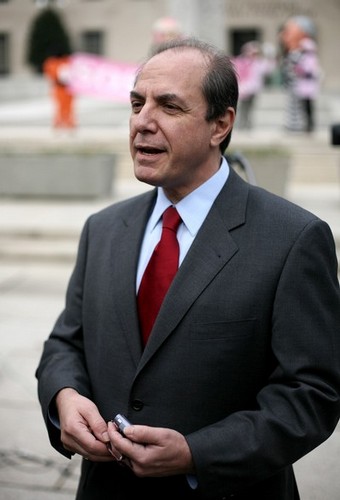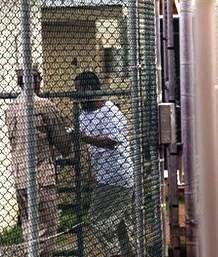Podcast: Play in new window | Download
Host Updates:
- Dr. Alan Berkman Remembered – Michael Smith
- Troy Davis Update /Amnesty USA Action / NAACP Action
- Holy Land Case Update
Segments This Week:
- Disgraceful Coverage: New York Times Article Riddled With Inaccuracy
- US “Preventive Detention” System In Place
———-
Disgraceful Coverage: New York Times Article Riddled With Inaccuracy
On May 21, the New York Times newspaper published a front page story, titled 1 in 7 Detainees Rejoined Jihad, Pentagon Finds. Journalist, Elisabeth Bumiller stated from the Pentagon report that 74 prisoners released from Guantanamo had “returned to terrorism.” Many have criticized Bumiller for parroting the Pentagon without investigation or at least being aware of the Seton Hall Law School’s work in challenging the Pentagon’s many recidivism reports. Using the phrase “rejoining jihad” assumes guilt to all former Guantanamo prisoners. The DOD counted Uighers and the Tipton 3, to have returned to the battlefields. The Myth of Return To The Battlefield from Guantanamo
Mark Denbeaux:
- Pentagon playing with numbers, first they said people (in Guantanamo) returned to the fight who were never in the fight, and then they said they returned to the fight from Guantanamo who were never in Guantanamo and never in the fight.
- None of the people that the DOD has listed in its 45 times has ever attacked American troops or its American interests or Americans anywhere in the world. With one exception, none of them have left their home country to whom they’ve returned.
- I was quoted in that article, the reporter called me for 2 days in a row, saying she’s under enormous pressure from her NYTimes editors.
- Talking with the Public Editor we both agreed comparing Elisabeth Bumiller with Judith Miller wasn’t fair but he said it was reminiscent of the lead up to the Iraq War
- A disgrace in the coverage of Guantanamo, a grotesque statement that was wrong with huge political consequences and they (NY Times) couldn’t un-ring that bell.
- There are NY Times reporters immersed in Guantanamo and National Security issues, why did they drop this in the lap of Elisabeth Bumiller? She said (Elisabeth Bumiller) that the Pentagon can’t release information because of politics. I said at least say that politics are involved. She said, I can’t say that.
- Add to that, that the editors were pushing her to get this story out. (Memorial Day Weekend)
- I think everyone agrees that the headline was grotesque and everyone noted the story came out on the morning of Cheney’s speech, and he had it at the ready in his speech.
- I was able with a group of Seton Hall Law students to go through the data the AP produced from a FOIA application.
- My students discovered that only 4 percent of those in Guantanamo were picked up by US forces, 86 percent were bounties in Pakistan and Afghanistan.
- It turned out that if you had 4 or 5 Arabs in a truck that was 20 or 25 thousand US dollars. But for one bounty, it 5 thousand dollars.
- For that 5 thousand dollar bounty you could feed your village as it said in the (CIA brochure) for a year. . .etc
- 55 percent of those in Guantanamo were not accused of commiting a hostile act.
- One of my conservative students asked, Where’s Mr. Big? We’re reading through the lists, he says what about this guy? He turns out to be under US allegation conscripted by the Taliban to be an assistant cook.
- This person surrendered but considered to be among the 45 percent of GTMO prisoners accused of hostile acts. His hostile act was surrendering to the Northern Alliance.
Guest – Seton Hall Law School Professor Mark Denbeaux gives an accurate reading on the Guantanamo prisoner recidivism rates. Professor Mark Denbeaux, one of Seton Hall’s most senior faculty members, is also the Director of the Seton Hall Law School Center for Policy and Research, which is best known for its dissemination of the internationally recognized series of reports on the Guantánamo Bay Detention Camp.
—-
US “Preventive Detention” System In Place
President Obama has held on to the power to allow for a “preventive detention” system that would indefinitely jail terror suspects in the United States without a trial. In a number of Guantanamo habeas corpus cases, the US government’s arguments set up a framework to give the president power to hold terror suspects indefinitely without charge or trial. This is the same broad executive power wielded by the Bush Administration that essentially defines a police state. It would be a total disaster if Congress were to pass a preventive detention regime into law say concerned civil rights lawyers.
- One of my colleagues called CCR and asked how can we help, and CCR doled out 13 Yemenis to represent at Guantanamo.
- We represented them since July 2004, along the way we’ve picked Albanians, more Yemenis and a Pakistani.
- I have my own non-profit human rights litigation firm called Appeal For Justice. I’ve had this up and running since it became clear I could no longer continue at a corporate law firm.
- I really lost interest in the corporate work that I was doing. I would come back from Guantanamo thinking on the way back, nothing else matters.
- I am right now at the secure facility at Arlington Virginia. This is a facility that the government set up to hold our interview notes and exhibits that are deemed to be classified information. It’s not a very pleasant place to work.
- So here are now in June, a year after the Supreme Court said that the men could bring Habeas cases, and they’re still here, five months after the Obama Administration said they would determine case by case who could be released.
- President Obama has released two men.
- My client Adnan Latif with severe psychological issues and a variety of neglected medical conditions. He’s tried to commit suicide a number of times that we know about.
- He’s a very intelligent young man, he writes beautiful poetry. In the last meeting I had with him, but under the table he had chipped off a piece of the formica and started sawing into the vein in his wrist.
- Then at a certain point he said I have a gift for you. I want something for you to remember me by, and he threw a small cup of his blood at me.
- Guantanamo prisoner suicides are considered acts of war against the US.
- I think the idea of preventive detention is an idea that goes too far analytically, because if you can preventively detain people why try them at all.
- I’m afraid that the Obama Administration may pursue legislation, that would strip jurisdiction and deny the right of Habeas.
- Forty percent of Guantanamo prisoners are Yemenis. This is diplomatic problem, not a case by case review.
Guest – Attorney David Remes , who represents 16 Guantanamo detainees from Yemen. Remes played a role in a challenge focused around the captives’ detention based on an avenue of appeal that the Detainee Treatment Act of 2005 (DTA) opened. The DTA closed the opportunity for captives who had not yet had writs of habeas corpus filed on their behalf. But the DTA allowed captives to challenge the determinations of their Combatant Status Review Tribunals, that they were properly classified as “enemy combatants”.
_______________________________________________________________




